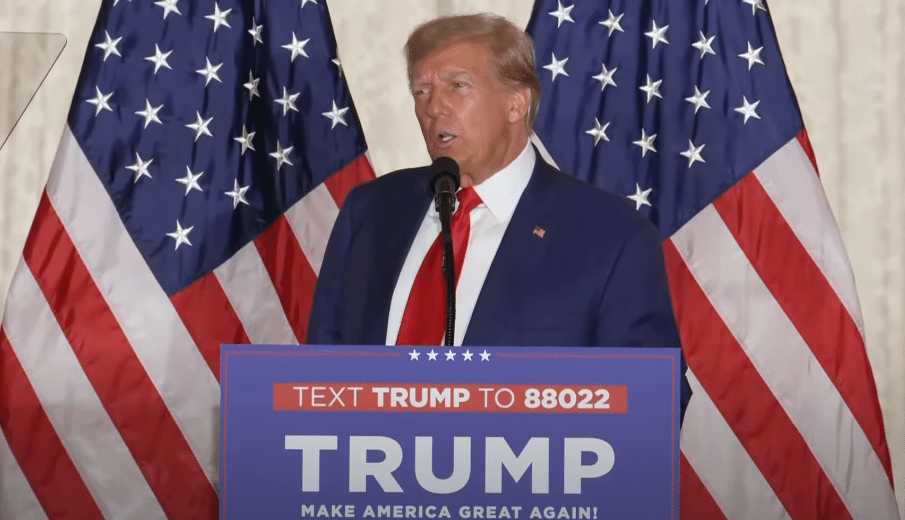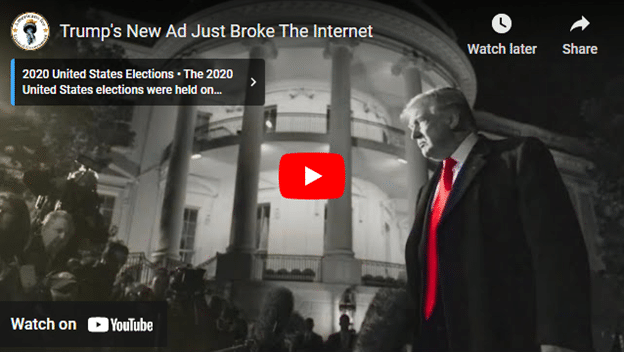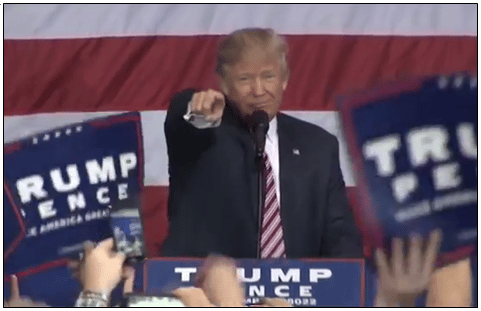April 05, 2023
Permission to republish original opeds and cartoons granted.
Trump: Democrats ‘want to interfere with our elections by using law enforcement. We can’t let that happen.’ He's right, but how do we stop the vicious cycle?

By Robert Romano
Former President Donald Trump on April 4 made his case to the American people that we no longer have equal justice in this country, warning his supporters that Democrats “want to interfere with our elections by using law enforcement” after he was arrested and arraigned in New York City, pleading not guilty to 34 counts of covering up some crime.
Which crime did he cover up? The indictment almost unbelievably did not say, stating that Trump had falsified business records with the “intent to defraud and intent to commit another crime and aid and conceal the commission thereof…”
It just says “another crime.” So, New York City actually told Trump, “You covered up a crime. We’ll tell you later which one it was.” This is a clear violation of the Sixth Amendment’s protection of the right to a notice of accusation, which states “In all criminal prosecutions, the accused shall enjoy the right… to be informed of the nature and cause of the accusation…”
For that you have to go to New York City District Attorney Alvin Bragg’s press conference on April 4, but even then no particular statute is cited in terms of which where he described a plan to “buy and suppress negative information to help Mr. Trump’s chances of winning the election” via non-disclosure agreements. Which election? The 2016 federal election.
You know, the one that New York City has no jurisdiction to enforce under the nation’s federal system. A potential federal campaign violation would be handled, not by New York City, but by the Federal Election Commission, which already turned down the case because it was unable to find a violation, voting predictably along partisan lines, where the Republicans on the commission voted no, and the Democrats on the commission voted yes.
It boils down to “You lied publicly about your alleged affair with Stormy Daniels” and then paid her for a non-disclosure agreement, which Democrats circumstantially wish to say was a campaign donation by Michael Cohen in excess of legal limits, the case Bragg is apparently bringing, but we cannot say with certainty because the charging document didn’t say.
But having an affair, even if true, is not a crime. And signing a non-disclosure agreement for a non-crime is similarly not a crime. Being a personal matter, it appears to be neither a campaign donation nor expenditure per se. And yet that is New York City’s case. If Trump bought a nice suit, it might make him look good, but it wouldn’t be a campaign expenditure either.
In a similar vein, "Pay attention to this, not that," is First Amendment protected speech. Agenda setting and issue priming are functions news media perform every day. New York City is criminalizing damage control and spin by individuals. Would removing erroneous search results from Google or offering a clarifying statement be an expenditure, too?
In this case, Bragg is pushing for falsifying business records in the first degree under New York State law, which requires that it with the intent to cover up another crime a class E felony, punishable up to five years in prison. If he had gone with falsifying records in the second degree, it would be a class A misdemeanor, punishable by up to one year in prison. So, Bragg is going for the more serious charge, and if unable to prove it, could go for the less serious charge, with the trial or trials likely extended through the duration of the 2024 election and beyond.
So, Trump is right. Democrats “want to interfere with our elections by using law enforcement…”
And he added, “We can’t let that happen.”
But how? In this case, it was an appeal to his supporters for the Republican nomination, in which is he is the clear frontrunner, leading his closest rival by an average of 26 points according to the latest RealClearPolitics.com average of national polls, that he is not being treated fairly by our legal system, but it begs the question: How to fix this, and more critically, to preserve the Union?
Americans overwhelmingly believe that the Trump indictment was politically motivated rather than motivated by a desire to enforce the law, according to a Quinnipiac University poll, 62 percent to 32 percent.
That predictably includes 93 percent of Republicans, but also 70 percent of independents who believe that the prosecution was politically motivated. Predictably, the only group that thinks this has to do with enforcing the law are partisan Democrats, 66 percent to 29 percent. So, the only constituency in favor of prosecuting their political opponents are themselves partisans.
Political independents oppose this banana republic behavior at every turn, because they fear what it will lead to. It’s why they are independents.
So, to restore equal justice, should Republican Attorneys General and District Attorneys start prosecuting Democratic candidates and officials, an eye for an eye? Would that be a deterrent—or an escalation?
How would independents respond? Would they like it, or similarly reject it on identical grounds?
Clearly, Americans are still overwhelmingly opposed to imprisoning one's opponents (or worse) when one party does it. But the real problem will come when both parties are doing it. Suddenly, then, a clear majority of Americans would support using the law to imprison their political opponents, a vicious cycle that would be almost impossible to break and invariably could lead to political violence as both sides seek revenge and reprisals.
Trump, besides noting the various attempts to, through legal means, prevent him from ever taking office in 2017 and thereafter to remove him from office, including by falsely accusing him of being a Russian agent, carrying on top secret investigations by the Justice Department for years only to turn up nothing — the true precedent of this breach of our legal system into a Hammurabi style system — also outlined a series of potential crimes that may have been committed by his opponents including President Joe Biden and 2016 Democratic nominee Hillary Clinton that are not and likely never will be prosecuted.
That does demonstrate an unequal application of justice, for certain, but the worry is that the GOP now sees red. Do they want revenge or do they want to see the civil society restored? We might not be able to have both. I recently spoke to my wife about this. She wants to see Trump to rise above this political strife to somehow unite the country. She wants the civil society back. I do, too.
When the civil society and liberty were lost in the Roman Republic, popular forms of government would not return for more than 1,000 years. Once lost, we might not get it back.
That is why once started, the cycle of violence involved in a civil war is so hard to break. Once you see red, you cannot see justice. Punish my opponents is not a platform, it's a pitfall. And only after great cost and tragedy can it be overcome, and even then it could take a generation or more to move on, assuming there is still a Constitution afterward.
In 2016 at the Republican National Convention, Trump initially rejected the convention’s chants of “lock her up” referring to Clinton’s keeping classified documents on her private server at home and instead implored “Let’s defeat her in November.”
Now, the true act of defiance against this corrupt system by the American people might be to vote for Trump in 2024, but that remains to be seen. And yet that alone would not on its own restore the civil society, which Alexis de Tocqueville noted comes with the necessary prerequisite that we respect our “reciprocal influence” upon one another to, as James Madison noted, “cur[e] the mischiefs of faction”.
Republicans cannot do it alone merely by turning the other cheek, it would take Democrats, too, to agree with one another to not drag each other into the state of nature by abusing the law to imprison political opponents as if it were the French Revolution.
Under the Constitution, the President has no authority to take America into a war on his own authority under Article II. It takes a vote of Congress to declare war. The Declaration of Independence in 1776 was signed “In Congress” by the Second Continental Congress in legislature. Nor does any individual have a natural right to start their own personal war, or retain some personal right to revolution.
That is because nobody, including District Attorney Bragg, who campaigned on imprisoning Trump, has the right to drag us back into the state of nature, which is where we’re headed if our nation’s leaders cannot find a way to interdict what could become an endless cycle of political revenge, political violence and ultimately, civil war.
Therefore, it will take great care and a strategy to restore confidence in our system. We are not a banana republic that prosecutes political opponents without end. Justice starts at the top, but Trump or any president needs a mandate. It is up to the American people to ultimately deliver a verdict in favor of restoring our civil society — before it is too late.
Robert Romano is the Vice President of Public Policy at Americans for Limited Government Foundation.
Video: Trump’s New Ad Just Broke The Internet

To view online: https://www.youtube.com/watch?v=7nt4VZWz3P8
White Non-College Turnout Declined in 2022, will it Pick Up Again in 2024?

By Manzanita Miller
Non-college white voters have supported Republicans at increasing rates in recent elections and their turnout rate rose to the highest in 20 years during the last presidential election.
However, analysis of the 2022 midterms shows that the non-college white vote declined in 2022 and fell by three percentage points compared to 2018. In key battleground states including Arizona, Ohio, and Georgia, the white-non college vote dropped even more.
This decline is an early warning to Republicans that a critical portion of their base is at risk of sitting out future elections. Whether this trend can be reversed remains to be seen. However, recent polls show the GOP base is decidedly in favor of restoring the policies of the Trump Administration, whether that involves reelecting the former president or another America First candidate.
YouGov survey data shows a full 91% of non-college whites say restoring the policies of the Trump Administration is important to them, compared to 75% of college-educated whites. Eighty-seven percent of voters with income under $50,000 say it is important to restore the policies of the Trump Administration compared to 83% of higher-income voters.
However, it is possible non-college whites will sit out the 2024 presidential election if the GOP nominates a candidate who seeks to dismantle the policies of the Trump Administration. The non-college white vote declined three percentage points in the midterms from 42% in 2018 to 39% in 2022, and the decline was much steeper in battleground states.
In Arizona, a ten-percentage point decline in the non-college white vote limited Republican margins and largely cost the GOP the Governor’s race. Arizona saw one of the steepest drop-offs with the non-college white vote going from 48% in 2018 to 38% in 2022.
White-con college voters in the rural counties largely sat out the election and contributed to Kari Lake’s loss in the Arizona Governor’s race. Our analysis shows in metropolitan Maricopa County, Lake and Hobbs received nearly identical shares of the vote that their 2020 party nominees did. However, the election was lost for Lake in Arizona’s rural counties, where she failed to secure the same share of the Trump vote as Hobbs did with the Biden vote.
In Gila, a small, rural, and rightwing county that Hobbs should have lost by a significant margin, Lake was only able to pull 80% of the 2020 Trump vote while Hobbs pulled almost 86% of the Biden vote. One of Lake’s largest losses compared to Trump was Greenlee, a county she ended up winning against Hobbs but with just 63% of the votes Trump got in 2020. Hobbs won a full 78% of the Biden vote in Greenlee.
The non-college white vote also declined significantly in Ohio, going from 55% in 2018 to 46% in 2022, a nine-percentage point drop.
Georgia and Wisconsin saw modest drops in the white non-college vote, five percentage points, and one percentage point, respectively. However, these are declines the GOP cannot afford.
Nationwide the U.S. Census shows the share of white non college Americans has declined as a share of eligible voters from 45% in 2016 to 40% in 2022. However, a decline in their share of the population is not necessarily correlated to a decline in voter turnout.
The 2020 general election marked the highest turnout rate for white non college voters in over 20 years and contributed to an overall rise in the white vote from 65% in 2016 to 71% in 2020. Nationwide, the white non-college turnout rate increased 6 points, rising from 58% in 2016 to 64% in 2020.
While it is true that non-college whites have declined modestly as a share of eligible voters due to demographic factors, what is missing from the conversation is the white non-college increase in turnout in the 2020 election.
In the 2020 presidential election, substantial increases in the white non college vote buffered Republican losses in battleground states. In Arizona, the white non college vote increased 10 points from 61% in 2016 to 71% in 2020. Georgia and Texas each saw a 9-point spike in white non-college voters, with Georgia rising from 57% to 66% and Texas rising from 54% to 63%. Pennsylvania saw an 8-point spike in the white non college vote from 57% in 2016 to 65% in2020. Wisconsin and Michigan saw a 5 and 4-point spike in the white non-college vote respectively, with Wisconsin rising from 68% in 2016 to 73% in 2020 and Michigan rising from 59% in 2016 to 63% in 2020.
Non-college whites continue to represent one of the largest voting blocs in the country at 44% of all U.S. voters, and they continue to vote overwhelmingly Republican. Despite a lackluster turnout in 2022, the GOP won white non college voters by 34 percentage points, up from 24 points in 2018. Those who turned out voted largely Republican, but turnout itself slipped as more stayed home. In 2020, Trump amassed 63% of their vote to Biden’s 27%. In fact, when breaking down Trump’s coalition of voters, almost 60% of Trump voters in 2020 were non-college whites.
For two presidential election cycles now, the white working class has played a critical role in Republican victories, contributing to former President Trump’s historic 2016 win, and weakening President Biden’s margins in 2020. However, their votes are not guaranteed. White non-college turnout rates have historically lagged those of college educated whites, and we saw this in the 2022 midterm election.
What is more, Trump is hardly a typical GOP candidate, and a preponderance of data suggests that working class Americans were inspired to action specifically because of Trump’s solutions to worsening economic conditions. Recent surveys show full 85% of likely GOP primary voters say restoring the policies of the Trump Administration is important to them. This does not necessarily mean the GOP base expects to re-elect Trump, but it does mean they demand an America First agenda.
Manzanita Miller is an associate analyst at Americans for Limited Government Foundation.
To view online: https://dailytorch.com/2023/04/white-non-college-turnout-declined-in-2022-will-it-pick-up-again-in-2024/
